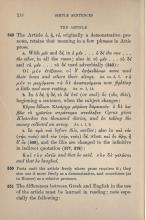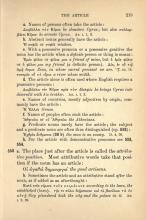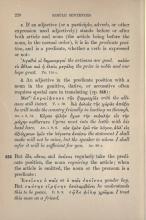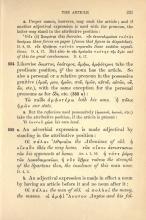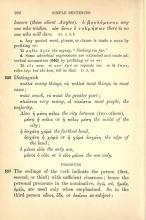549. The Article ὁ, ἡ, τό, originally a demonstrative pronoun, retains that meaning in a few phrases in Attic prose
a. With μέν and δέ, in ὁ μέν . . . ὁ δέ (the one . . .the other), in all the cases; also in τὸ μέν . . . τὸ δέ and τὰ μέν . . . τὰ δέ used adverbially (§ 540).
Oἱ μὲν ἐτόξευον, οἱ δʼ ἐσφενδόνων.
Some used their bows and others their slings.
Xen. Anabasis 3.3.7
τὰ μέν τι μαχόμενοι τὰ δὲ ἀναπαυόμενοι
now fighting a little and now resting
Xen. Anabasis 4.1.14
b. In ὁ δέ, ἡ δέ, τὸ δέ (but or and he / she / this), beginning a sentence, when the subject changes.
Κῦρος δίδωσι Κλεάρχῳ μῡρίους δάρεικούς· ὁ δὲ λαβὼν τὸ χρῡσίον στράτευμα συνέλεξεν.
Cyrus gives Klearchos ten thousand darics, and he taking the money collected an army.
Xen. Anabasis 1.1.9
c. In πρὸ τοῦ (before this, earlier); also in καὶ τόν (τήν, τούς) and τὸν (τὴν, τοὺς) δέ, when καὶ ὅς ἔφη, ἦ δʼ ὅς (§ 560), and the like are changed to the infinitive in indirect quotation (§§ 577 and 578):
Καὶ τὸν εἰπεῖν
and that he said
τὸν δὲ γελάσαι
and that he laughed
550. Poets omit the article freely where prose requires it; they also use it more freely as a demonstrative, and sometimes (as in Homer) as a relative pronoun.
551. The differences between Greek and English in the use of the article must be learned in reading; note especially the following:
a. Names of persons often take the article.
Διαβάλλει τὸν Κῦρον.
He slanders Cyrus
Xen. Anabasis 1.1.3
but also
συλλαμβάνει Κῦρον.
He arrests Cyrus.
Xen. Anabasis 1.1.3
b. Abstract nouns generally have the article.
Ἡ σοφίᾱ or σοφίᾱ
wisdom
c. With a possessive pronoun or a possessive genitive the noun has the article when a definite person or thing is meant.
Ἐμὸς φίλος or φίλος μου
a friend of mine
but
ὁ ἐμὸς φίλος or ὁ φἰλος μου
my friend (a definite person)
Δία, ἐν οὗ τῷ ἱερῷ ἐσμεν
Zeus, in whose sacred precinct we are
Thucydides 3.14.1
ποταμὸς οὗ τὸ εὖρος
a river whose width
d. The article alone is often used where English requires a possessive pronoun.
Διαβάλλει τὸν Κῦρον πρὸς τὸν ἀδελφόν.
He brings Cyrus into discredit with his brother.
Xen. Anabasis 1.1.3
e. Names of countries, mostly adjectives by origin, commonly have the article.
Ἡ Ἑλλάς
Greece
f. Names of peoples often omit the article.
Ἀθηναῖοι or οἱ Ἀθηναῖοι
the Athenians
g. Predicate nouns rarely have the article; the subject and a predicate noun are often thus distinguished (cp. § 552).
Ἐχθρὸς ᾱ̔́νθρωπος. (§ 36.b)
The man is an enemy.
Demosthenes 4.50
h. For the article with demonstrative pronouns see §§ 553 and 554 (below).
552.a. The place just after the article is called the attributive position. Most attributive words take that position if the noun has an article.
Oἱ ἀγαθοὶ δημιουργοί
the good artisans
b. Sometimes the article and an attributive stand after the noun, as if added as an afterthought.
Κατὰ τοὺς νόμους τοὺς κειμένους
according to the laws, the established (laws)
τήν τε πόλιν διήρπασαν καὶ τὰ βασίλεια τὰ ἐν αὐτῇ.
They plundered both the city and the palace in it.
Xen. Anabasis 1.2.26
c. If an adjective (or a participle, adverb, or other expression used adjectively) stands before or after both article and noun (the article being before the noun, in the normal order), it is in the predicate position, and is a predicate, whether a verb is expressed or not.
Ἀγαθοὶ οἱ δημιουργοί
the artisans are good
καλὸν τὸ ἆθλον καὶ ἡ ἐλπὶς μεγάλη.
The price is noble and our hope great.
Plato Phaedo 114c
d. An adjective in the predicate position with a noun in the genitive, dative, or accusative often requires special care in translating (cp. § 548).
Μετʼ ἀκραιφνοῦς τῆς ξυμμαχίᾱς
with the alliance still intact
Thucydides 1.19
διὰ φιλίᾱς τῆς χώρᾱς ἀπάξει.
He will make the country friendly in leading us through.
Xen. Anabasis 1.3.14
Κῦρος ψῑλὴν ἔχων τὴν κεφαλὴν εἰς τὴν μάχην καθῑ́στατο.
Cyrus went into the battle with his head bare.
Xen. Anabasis 1.8.6
οὐκ ἐμὸν ἐρῶ τὸν λόγον, ἀλλʼ εἰς ἀξιόχρεων ῡ̔μῖν τὸν λέγοντα ἀνοίσω.
The statement I shall make will not be mine, but the speaker to whοm I shall refer it will be sufficient for you.
Plato Apology 20e
553. But ὅδε, οὗτος, and ἐκεῖνος regularly take the predicate position, the noun requiring the article; when the article is omitted, the noun or the pronoun is a predicate.
Ἐκεῖνος ὁ παῖς or ὁ παῖς ἐκεῖνος
yonder boy
but
ταύτην εἰρήνην ὑπολαμβάνει.
He understands this to be peace.
Demosthenes 9.9
τῷδε φίλῳ χρῶμαι.
I treat this man as a friend.
a. Proper names, however, may omit the article; and if another adjectival expression is used with the pronoun, the latter may stand in the attributive position.
Ὅδε (ὁ) Σωκράτης
this Socrates
τὰς ἐπιστολιμαίους ταύτᾱς δυνάμεις
these forces on paper (forces that figure in dispatches)
Demosthenes 4.19
τὰς ἐξαίφνης ταύτᾱς στρατείᾱς
these sudden expeditions
Demosthenes 4.17
But also
ἐκ τῆς ἀμελείᾱς ταύτης τῆς ἄγᾱν
out of this too great carelessness
Demosthenes 4.17
554. Likewise ἕκαστος, ἑκάτερος, ἄμφω, ἀμφότερος take the predicate position, if the noun has the article. So also a personal or a relative pronoun in the possessive genitive (ἐμοῦ, μου, ἡμῶν, σοῦ, ῡ̔μῶν, αὐτοῦ, αὐτῶν, οὗ, ὧν, etc.), with the same exception for the personal pronouns as for ὅδe, etc. (§ 553.a, above).
Tὼ παῖδε ἀμφοτέρω
both his sons
ἡ πόλις ἡμῶν
our state
a. But the reflexives used possessively (ἐμαυτοῦ, ἑαυτοῦ, etc.) take the attributive position, if the article is present.
Ἡ ἑαυτοῦ χώρᾱ
his own land
555. a. An adverbial expression is made adjectival by standing in the attributive position.
Oἱ πάλαι Ἀθηναῖοι
the Athenians of old
ἡ οἴκαδε ὁδός
the way home
τῶν οἴκοι ἀντιστασιωτῶν
his opponents at home
Xen. Anabasis 1.1.10
ἡ τότε ῥώμη τῶν Λακεδαιμονίων, ἡ νῦν ὕβρις τούτου
the strength of the Spartans then, the insolence of this man now
Demosthenes 4.3
b. An adjectival expression is made in effect a noun by having an article before it and no noun after it.
Oἱ πάλαι
the men of old
οἱ πολλοί
the many, the masses
οἱ ἀμφὶ Ἄνυτον
Anytos and his followers (those about Anytos)
ὁ βουλόμενος
any one who wishes
οὐκ ἔστιν ὁ τολμήσων.
There is no one who will dare.
Xen. Anabasis 2.3.5
c. Any quoted word, phrase, or clause is made a noun by prefixing τό:
Tὸ μηδὲν ἄγᾱν
the saying, "Nothing too far."
d. Some adverbial expressions are extended and made adverbial accusatives (§ 540) by prefixing τό or τά.
Tὰ νῦν
now
τὸ κατʼ ἐμέ
as regards me
τὸ δὲ ὅπως, τοῦτο λέγε.
But the how, tell us that.
Demosthenes 3.10
556. Distinguish
πολλά many things
τὰ πολλά most things, in most cases
πολύ much
τὸ πολύ the greater part
πλεῖστοι very many
οἱ πλεῖστοι most people, the majority
also
ἡ μέση πόλις the city between (two others),
μέση ἡ πόλις or ἡ πόλις μέση the midst of the city
ἡ ἐσχάτη χόρᾱ the farthest land
ἐσχάτη ἡ χώρᾱ or ἡ χώρᾱ ἐσχάτη the edge of the land
ὁ μόνος υἱός the only son,
μόνος ὁ υἱός or ὁ υἱὸς μόνος the son only

